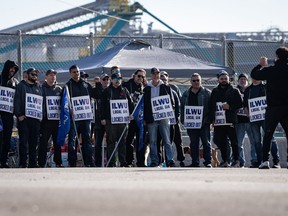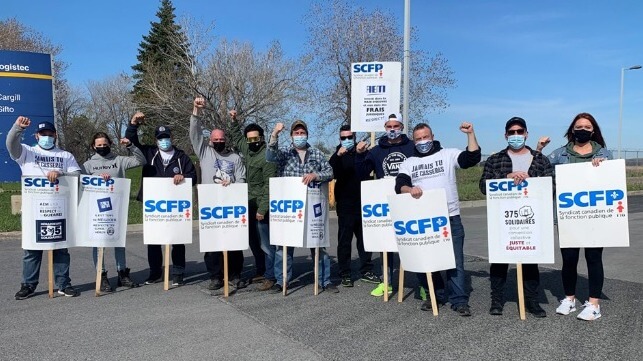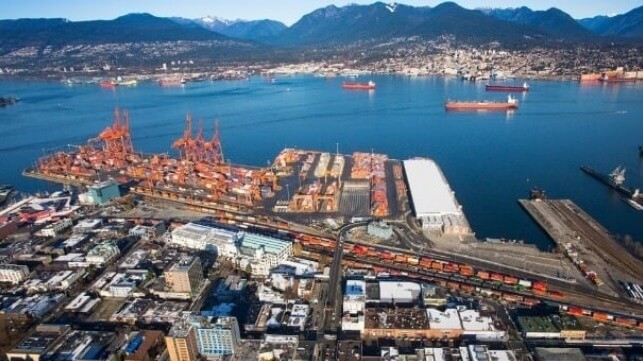Negotiations are set to resume in B.C. port work stoppage
The International Longshore and Warehouse Union Local 514 says they have been called back to the table
Author of the article:
The Canadian Press
Chuck Chiang
Published Nov 07, 2024 •

Talks are set to resume between the union representing more than 700 locked-out British Columbia port supervisors and their employers.
A representative for the International Longshore and Warehouse Union Local 514 said they have been called back to the table with the B.C. Maritime Employers Association and federal mediators on Saturday, and that Sunday and Monday have been set aside for talks to continue.
The employers association confirmed in a statement that a meeting was set for Saturday and added that its “final offer” has been on the table for more than a week, representing a “fair and balanced proposal for employees.”
Federal Labour Minister Steven MacKinnon had earlier Thursday criticized a lack of progress in talks to end the dispute, as well as a dockworkers strike at the Port of Montreal, saying there had been a “concerning lack of urgency.”
In a statement on X before the talks being announced, MacKinnon said he was “closely monitoring” bargaining in the disputes in B.C. and Montreal, which he described as “progressing at an insufficient pace.”
“Public services, such as ports, exist to serve the needs of Canadians,” MacKinnon’s statement said. “It is with this in mind that the federal government supports these negotiations. The parties must reach an agreement quickly.”
B.C.’s port lockout spilled into its fifth day on Friday, while Port of Montreal dockworkers have been on strike at two container terminals since Oct. 31.
The fresh talks in B.C. come after the union said it had filed a complaint against the employers, accusing them of “bargaining in bad faith, making threats, intimidation, coercion and interference with the administration of a union.”
Frank Morena, president of International Longshore and Warehouse Union Local 514, said in a statement that they filed the complaint with the Canada Industrial Relations Board, accusing the employers association of favouring confrontation rather than negotiation as an end to the dispute.
“Once again, the BCMEA is doing everything it can to push the federal government into intervening instead of doing its job to bargain a new contract — it’s offensive and we expect our complaints to be upheld,” Morena said.
The employers association said in its statement that it will be denying any wrongdoing, calling the complaint “meritless.”
“The BCMEA remains committed to negotiating a fair and equitable agreement that recognizes the efforts and skills of the waterfront workforce and restores supply chain operations as quickly as possible,” the statement said.
Canadian retailers expressed their frustrations through their industry association, saying the sector was increasingly concerned with the lack of movement in the disruptions at Canada’s two largest ports.
Matt Poirier, vice-president of federal government relations with the Retail Council of Canada, said Thursday there “doesn’t seem to be any urgency” in resolving the disputes in B.C. and Quebec and it may result in empty shelves as the holiday season approaches.
“Manufacturing, agriculture and retailers like our sector that rely on these services don’t have a say in the matter,” Poirier said. “We’re not seated at the table, yet we’re the ones that are bearing all the costs and the punishment of these delays.”
Poirier described the situation as a “triple-threat” of labour disruptions, referencing the port stoppages and uncertainty at Canada Post.
He said retailers could face a “staggering” effect in the holiday season “where every delivery counts,” with four days of port disruptions potentially equating to about a month in delays due to ripples in the supply chain.
“We just want it to happen, and it frankly should have happened a lot sooner than it has,” Poirier said of settlements in the disputes.
Before the talks were announced, a retired University of British Columbia professor and labour expert, Mark Thompson, said it appeared the employers are “playing hardball” by making what they call a final offer to the union.
“They’ve said that the offer that they’ve put on the table is their last offer,” Thompson said. “Maybe they mean that. I’ve always wondered if it’s the last offer and it’s not accepted, what happens next? They may be hoping that the government will intervene in some way, but that’s very hard to do.”
The right to strike in a labour conflict is protected in the Canadian Constitution, Thompson noted, making federal intervention difficult.
Concerning Absence of Urgency” as Canadian Port Strikes Get Nasty

Strikes are continuing on each of Canada’s coasts shutting down many of the busiest ports in the country. As the actions are dragging on, the unions and employers are trading barbs while government officials and businesses express frustrations.
Canada’s Minister of Labour and Seniors Steven MacKinnon summed up the growing sentiment in Canada writing on social media, “Both sets of talks are progressing at an insufficient pace, indicating a concerning absence of urgency from the parties involved… The parties must reach an agreement quickly.”
MacKinnon reports he is monitoring the situation while saying the “federal government supports these negotiations.” However, frustration is growing in the business communities, with the Retail Council of Canada reiterating that there “doesn’t seem to be any urgency” in resolving the labor disputes across British Columbia and Quebec. Businesses continue to call for the federal government to intervene with the Canadian Federation of Independent Business opening questioning “How long can the government let the whole situation last?”
The Canadian Union of Public Employees (CUPE) of which the striking Montreal group is a local however is cautioning the federal government to let the issues be resolved. They noted that the federal government intervene in the 2021 strike imposing arbitration. The union contends the issues in the current strike were all left unresolved due to the intervention.
Labor experts however are saying it appears the employers are “playing hardball” on both coasts. On the West Coast, the B.C. Maritime Employers Association has been saying for nearly two weeks it has made its last, best offer. They assert it provides a 19 percent pay increase for median pay, 16 percent improvement in pension entitlements, and provides for a large lump sum payment and “does not require any concessions from the union.”
BCMEA locked out approximately 700 foremen starting with the Monday afternoon shift in a dispute over the contract that expired at the end of 2023. All week both sides remained dug in with no talks scheduled while Vancouver, Canada’s largest port, and Prince Rupert, Canada’s third largest port, were both mostly at a standstill.
Both sides have been ordered back to the negotiations on Saturday afternoon with the union saying it has reserved time on Sunday and Monday for further talks if needed. The talks will be run by a federal mediator. The issues relate primarily to the use of automation and its impact on employees and the work-life schedule.
The local representing the foremen however also filed an unfair labor practice complaint with Canada’s Industrial Relations Board. They assert the employers have threatened to pull terms from the expired contract and are doing everything possible to force the federal government to intervene. BCMEA responded denying any wrongdoing and calling the complaint “meritless.”
The dispute in Montreal is also growing more contentious. About 320 longshore workers have been on strike at two of the largest container terminals which account for 40 percent of the port’s volume. They went on strike on October 31.
The East Coast Marime Employers Association on November 7 submitted what it is calling its “final, comprehensive offer” to the Longshoremen’s Union local. They said it provides a 20 percent pay increase over six years, starting with three percent in the first four years as well as improvements in pension plan and benefits.
The MEA however set a deadline for acceptance of Sunday evening, November 10, saying it would otherwise lock out the union across the port. “Only essential services and activities to longshoring will continue.”
CUPE says it is reviewing the proposal for the Montreal longshoremen. In the mean time, disruptions are spreading across Canada as businesses complain of problems and concerns over supplies.
Vessels Pile Up as Foreman Lockout Continues at Canada’s West Coast Ports

The strike/lockout of the foreman for the dockworkers union in Canada is continuing with reports that there are no new talks between the two sides. As it enters its third day, vessels have begun to pile up at Vancouver while business associations are increasingly calling for the federal government to intervene.
The BC Maritime Employers Association told The Canada Press that there has been no engagement with the local representing the foremen or federal mediators since the lockout began Monday afternoon. The employers continue to blame the local for calling a strike while saying the offer they presented is the same as what the longshore union accepted in July 2023. They also added provisions to address the foremen’s issues while saying it does not require any concessions of the union nor to waive the technological change notice provisions.
The association representing the employers has repeatedly called this its “final offer” in the contract negotiations that date back to March 2023. They however said without qualifying that the employers may be “required to reassess” their position on the current offer.
The strike is impacting all the container terminals including in Vancouver which accounts for 40 percent of the cargo movement in Canada. General cargo and some bulk are impacted but not grain or cruise ships.
Carriers appear to be taking a wait-and-see approach so far while the terminals remain closed. Containers ships, including CMA CGM Orfeo, HMM Peridot, MOL Premium, YM Plum, and Ever Steady, all are waiting outside Vancouver Island. Reports said two more were due to arrive during the day on Thursday. Several car carriers are also waiting off the terminal while in the Out Vancouver Harbor and elsewhere more than two dozen bulkers have piled up.
“The shutdown of West Coast ports endangers approximately C$800 million (US$577 million) in daily trade in goods. This represents around 25 percent of Canada’s daily merchandise trade and will affect businesses, workers, and consumers across the country,” wrote the Business Council of British Columbia. They acknowledged the complexities of labor negotiations while emphasizing the importance of an agreement and saying “However, those negotiations having failed, we now call upon the federal government to intervene to reach a swift settlement.”
Similarly, the BC Chamber of Commerce issued a statement saying it was “disappointed” by the inability of the two to negotiate a new contract. Like the Business Council, the Chamber is saying the federal government should be involved so that both sides can work diligently to find a resolution quickly.
“Our port infrastructure is too critical to the health and success of businesses and workers to have this dispute continue one moment longer. It will only serve to inflict further harm to our provincial and national economies and our international reputation as a reliable trading partner,” writes Fiona Famulak, President and CEO of the BC Chamber of Commerce.
Businesses note that the pressures are greater in this year’s strike because of the time of year. In July 2023, the longshore union was on strike for 13 days closing down the West Coast ports.
The government has convened an Industrial Inquiry Commission to explore the labor disputes at Canada’s West Coast ports. It is due to release its recommendations in the Spring of 2025.
No comments:
Post a Comment